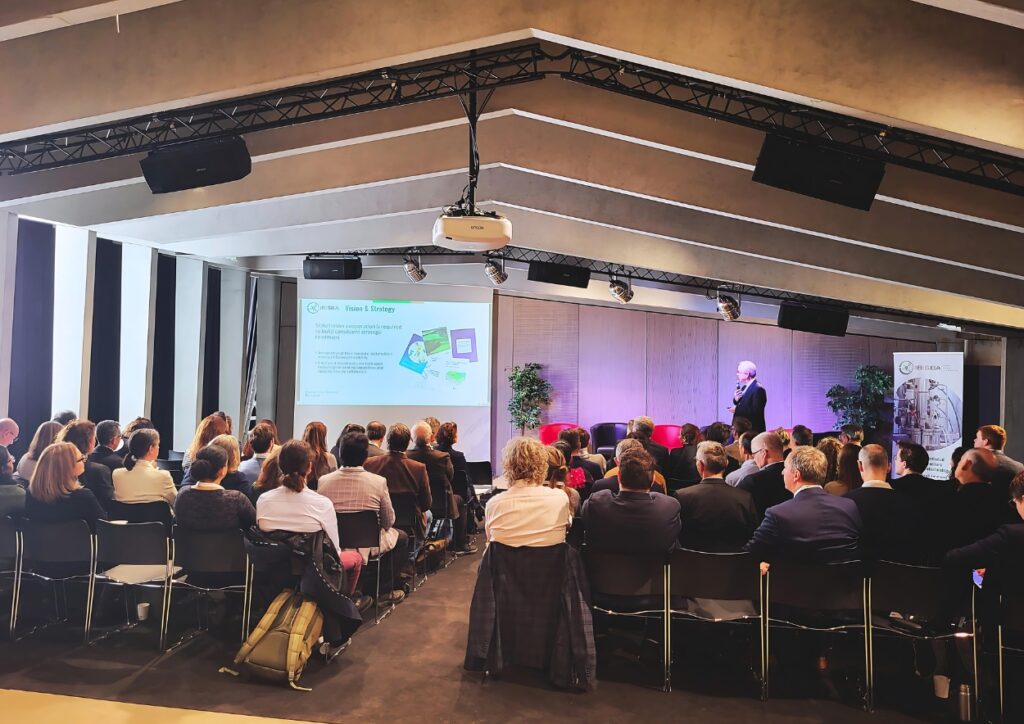Newsletter July 2024
IBISBA Mini Summit set the stage for European cooperation

The two-day IBISBA mini-summit, "Inspiring Biotech Solutions," held at the prestigious Fondation Victor Lyon in France from January 31st to February 1st, was a pivotal moment that united a diverse array of researchers, political stakeholders, and industry representatives. This collaborative event aimed to consolidate industrial biotechnology and biomanufacturing cooperation, inviting all participants to contribute to the circular bioeconomy transition.
As IBISBA enters a new critical phase in its move towards legal status and France becomes the designated host for the statutory seat of IBISBA-ERIC, the event was designed to rally political support for IBISBA’s pan-European mission. The participation of influential figures like Philippe Mauguin, CEO of INRAE, and French ministerial officials underscored its significance. Their presence aligned support for IBISBA’s objectives and fostered bridges between different stakeholder groups, promoting cooperation in favour of industrial biotechnology and bolstering Europe’s biomanufacturing capabilities.
An increasing number of national and regional bioeconomy strategies promote cross-sectoral cooperation. Therefore, mapping out national and European research funding initiatives enabling these strategies is crucial to optimise funding and spur industrial biotechnology research and innovation. But this is not a task for a few; it requires efforts on interoperability and standards by all research, development, and innovation actors. A strategic collaborative framework is essential to achieve systemic change. By tackling priorities following a relevant chronology, this framework must address various challenges from raw material to process, scales of operation, funding, and policies.
True collaboration requires a shared understanding of what unites us. We need to tackle misconceptions and establish clear and widely recognised definitions. Personal interests and lobbying activities must be kept away from establishing solid foundations. Translating findings into diverse cultural contexts is imperative to unite our field beyond borders.
Jim Philp’s intervention provided OECD data that clearly illustrated the persistence of a highly uneven playing field that is suffocating the development of the circular bioeconomy—the fossil sector benefits from nearly 1 trillion $ per year in explicit subsidies. According to the International Monetary Fund, if one also considers implicit subsidies, this figure rises to 7 trillion $ per year! Faced with such an absurdly distorted economic framework, it is unsurprising that biobased products are economic non-starters.
A roundtable discussion featuring featured distinguished voices, including Carole Caranta (INRAE), Dr Anne-Gaelle Collot (EuropaBio), Sarah Fadda (Siemens), Nicoló Giacomuzzi-Moore (Circular Bio-based Europe Joint Undertaking), Jim Philp (OECD), and Markus Wolperdinger (Fraunhofer IGB), explored how European cooperation in industrial biotechnology can propel the bioeconomy forward across sectors, inviting attendees to consider their roles in this collective effort.
Monique AXELOS from INRAE showcased how biomass and biotechnology are revolutionising the landscape of chemical and fuel production, enabling a transition to a sustainable and circular bioeconomy through a combination of cutting-edge research and sustainable practices.
Beatrice Cobucci-Ponzano from CNR, Italy, then presented insights into Italy’s resilience project ITINERIS, while Vitor Martins Dos Santos from WUR, Netherlands, delved into funding initiatives in the Dutch biotech landscape. Nicoló Giacomuzzi-Moore, Executive Director of CBE-JU, Belgium, shed light on funding opportunities in the European bioeconomy, particularly the strategies and initiatives aimed at creating a bio-based economy that prioritises sustainability and environmental responsibility.
Paul Freemont from Imperial College of London, UK, presented findings of three workshops held in the regions of America, Asia/Pacific, and Europe/Africa, respectively, regarding the need to lay the groundwork for establishing open voluntary standards for engineering biology technologies to accelerate the commercialisation of the bioeconomy.
Markus Schmidt from Biofaction, Austria, echoed this, discussing biosafety standards and metrics. He highlighted that the lack of innovative standards for biosafety in synthetic biology is an unresolved policy gap that limits many potential applications.
Subsequent sessions explored interoperable workflows for biotechnology, with contributions from Jean-Loup Faulon from INRAE, France, and Antonis Kokossis (NTUA), who provided remarks on the importance of interoperability for IBISBA. Jussi Jantti from VTT, Finland, finally shared insights into IBISBA’s experience.
In the face of international competition, public or private actors can only support the development of industrial biotechnology at the level needed for Europe to succeed in the bioeconomy transition. Europe must adopt a more integrated, multidisciplinary approach to transform into a modern, resource-efficient, competitive economy. This transformation begins with a common understanding of the bioeconomy, biotechnology, and biomanufacturing, where we fit, and how to collaborate better. The collective vision we have for industrial biotechnology will require us to be bold and speak the truth. Together, we must confront subsidies and investments that bolster fossil fuel industries and challenge prevailing narratives surrounding biotechnology.
